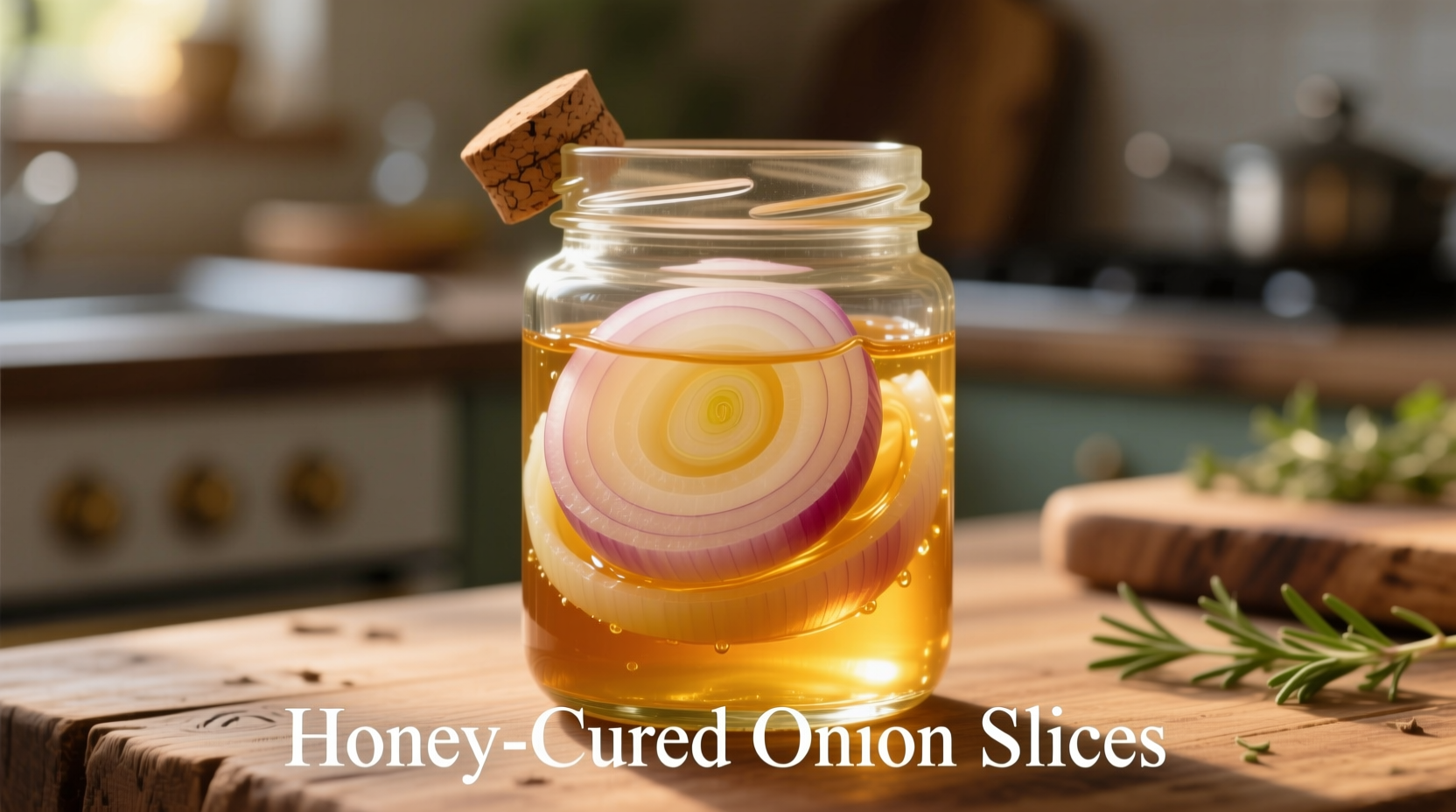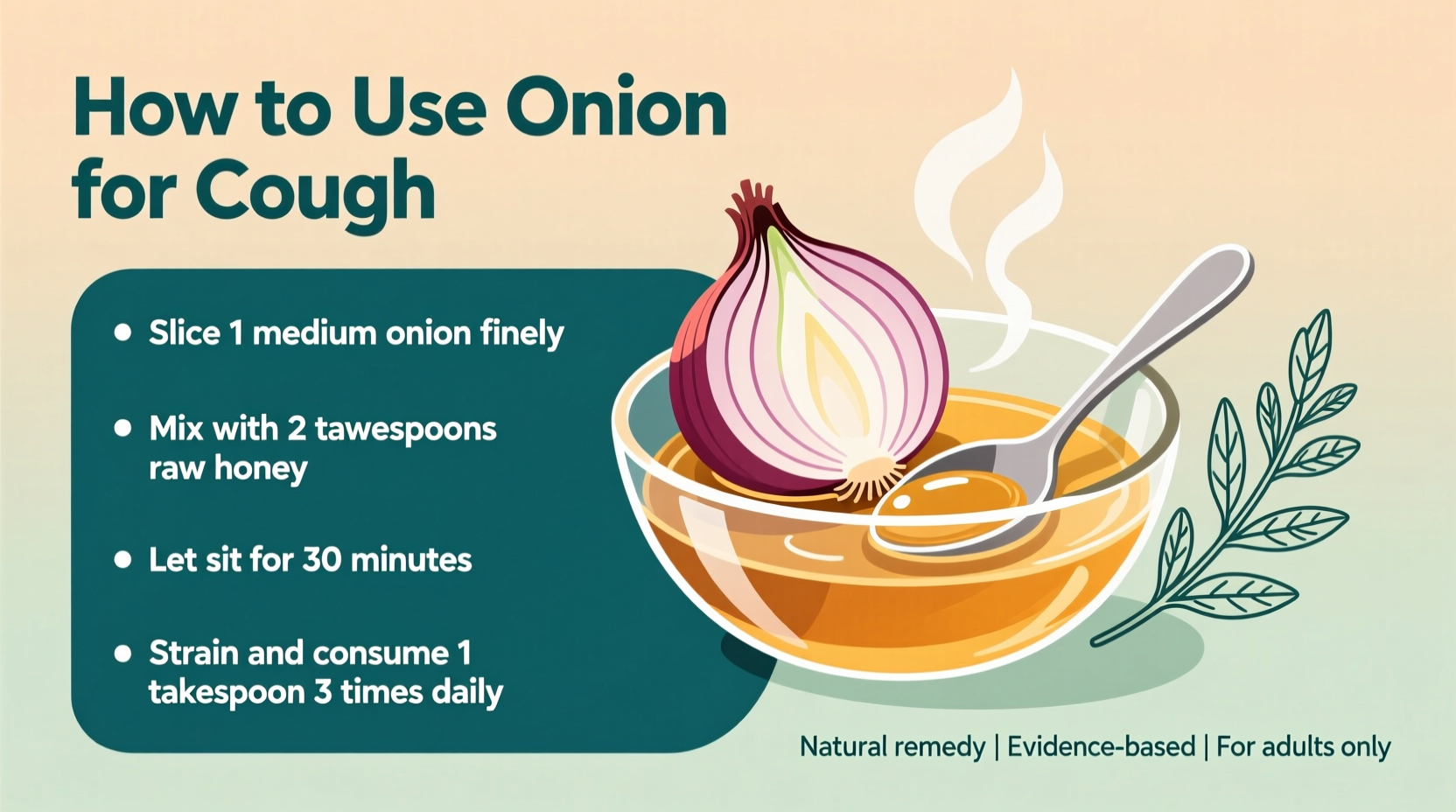Onions contain quercetin and allicin compounds that may help soothe coughs naturally. The most effective method is making onion syrup: slice one medium onion, layer with 2 tablespoons of honey in a jar, let sit for 4-6 hours, then take 1 teaspoon every 2-3 hours as needed. This traditional remedy works by thinning mucus and reducing throat irritation.
When that persistent cough keeps you up at night, reaching for chemical-laden medicines isn't your only option. For centuries across multiple cultures, onions have served as a trusted home remedy for respiratory discomfort. This humble kitchen staple contains powerful compounds that target cough symptoms at their source, offering relief without artificial additives or potential side effects.
Why Onions Work for Cough Relief
Modern research confirms what traditional medicine has known for generations: onions possess significant therapeutic properties. The National Center for Complementary and Integrative Health (NCCIH) acknowledges that certain food-based remedies can provide symptomatic relief for minor respiratory issues. Onions contain:
- Quercetin - A natural antihistamine that reduces throat inflammation
- Allicin - An antimicrobial compound fighting respiratory pathogens
- Sulfur compounds - Helping break up mucus congestion
- Vitamin C - Supporting immune function during illness
Unlike over-the-counter cough suppressants that merely mask symptoms, onion remedies address multiple aspects of coughing simultaneously. A 2020 review published in Phytotherapy Research noted that Allium vegetables (including onions) demonstrate expectorant, anti-inflammatory, and antimicrobial activities relevant to respiratory health.
| Remedy Type | Onset of Relief | Duration of Effect | Best For |
|---|---|---|---|
| Onion Syrup | 30-60 minutes | 2-3 hours | Dry coughs, nighttime relief |
| Onion Poultice | 15-20 minutes | 4-6 hours | Chest congestion, wet coughs |
| Onion Steam | Immediate | 1-2 hours | Sinus-related coughs |
| Commercial Cough Medicine | 15-30 minutes | 4-8 hours | Temporary symptom suppression |
Four Proven Methods to Use Onion for Cough
1. Onion Honey Syrup (Most Effective)
This traditional preparation maximizes onion's therapeutic compounds while adding honey's soothing properties. The World Health Organization recognizes honey as an effective cough remedy for adults and children over 1 year.
- Peel and thinly slice one medium yellow onion
- Place slices in a glass jar alternating with 2 tablespoons of raw honey
- Cover and let sit at room temperature for 4-6 hours (overnight works best)
- Strain the liquid into a clean container
- Take 1 teaspoon every 2-3 hours as needed
The honey draws out the onion's active compounds while creating a soothing syrup. Store in the refrigerator for up to 1 week. For children over 1 year, reduce to 1/2 teaspoon doses.
2. Onion Chest Poultice for Congestion
When coughing comes with chest tightness, this external application helps loosen mucus and calm respiratory muscles.
- Bake one large onion at 350°F (175°C) for 30 minutes until soft
- Mash the onion and mix with 1 tablespoon coconut oil
- Cool to warm (not hot) temperature
- Spread mixture on cotton cloth
- Place on chest for 15-20 minutes before bed
The Mayo Clinic notes that warm compresses can help relieve chest congestion associated with coughs. This poultice combines heat therapy with onion's expectorant properties for maximum effect.
3. Onion Steam Inhalation
For coughs related to sinus drainage or dry air, steam therapy with onion provides immediate relief.
- Chop one onion and place in heatproof bowl
- Pour 2 cups boiling water over onions
- Cover head and bowl with towel
- Breathe steam for 5-10 minutes
- Repeat 2-3 times daily as needed
This method works particularly well for coughs triggered by post-nasal drip. The Centers for Disease Control and Prevention (CDC) recommends steam therapy as a safe home treatment for respiratory symptoms when done properly.
4. Onion Tea for Throat Soothing
When sore throat accompanies your cough, this simple tea provides dual relief.
- Simmer 1 chopped onion in 2 cups water for 15 minutes
- Add 1 teaspoon ginger (optional)
- Strain and add lemon juice and honey to taste
- Drink 2-3 times daily while symptoms persist
Ginger adds additional anti-inflammatory benefits, creating a powerful combination for throat irritation. This preparation follows traditional European herbal medicine practices documented in historical apothecary texts.
Important Safety Considerations
While onion remedies are generally safe, certain situations require medical attention instead of home treatment:
- Children under 1 year - Never give honey due to botulism risk
- Persistent symptoms - Cough lasting more than 10-14 days
- Severe symptoms - High fever, difficulty breathing, or bloody mucus
- Underlying conditions - Asthma, COPD, or compromised immune system
The American Lung Association emphasizes that while home remedies can provide symptomatic relief for minor coughs, they shouldn't replace professional medical care when needed. Always consult your healthcare provider if symptoms worsen or persist beyond two weeks.
Historical Context of Onion Remedies
Onions have served as medicinal plants across civilizations for thousands of years. Ancient Egyptian medical texts from 1550 BCE mention onions for respiratory ailments. During the 1918 influenza pandemic, onion-based remedies were widely used when conventional medicines were scarce. This historical timeline shows the enduring value of onion treatments:
- 1550 BCE - Ebers Papyrus documents onion use for breathing problems
- 1st Century CE - Roman physician Dioscorides recommends onions for coughs
- 17th Century - English herbalists prescribe onion syrup for chest complaints
- 1918 - Onions used widely during influenza pandemic
- Present Day - Modern research confirms traditional uses
This historical perspective demonstrates why onion remedies have persisted through generations - they deliver tangible results for common respiratory issues.

When Onion Remedies Won't Help
Understanding the limitations of home treatments is crucial for your health. Onion remedies work best for:
- Common cold-related coughs
- Mild bronchitis symptoms
- Nighttime coughing disrupting sleep
- Post-viral coughs during recovery phase
They're less effective for:
- Bacterial infections requiring antibiotics
- Asthma-related coughing
- Whooping cough (pertussis)
- Coughs caused by GERD or allergies
The key is recognizing when your cough requires professional medical evaluation rather than home treatment. If your cough persists beyond two weeks, worsens after initial improvement, or comes with high fever, seek medical attention.
Maximizing Your Onion Remedy Results
For best results with onion cough remedies:
- Use yellow onions - they contain higher quercetin levels than white varieties
- Allow proper infusion time (4-6 hours minimum for syrup)
- Combine with rest and hydration for faster recovery
- Store remedies properly in glass containers
- Be consistent with dosing schedule
Remember that natural remedies work gradually. Most users report noticeable improvement within 24-48 hours of consistent application. Patience and proper technique yield better results than expecting immediate miracles.
Complementary Natural Cough Relief Strategies
Enhance your onion remedy's effectiveness with these evidence-based approaches:
- Hydration - Warm liquids thin mucus (aim for 8-10 glasses daily)
- Humidification - Use cool-mist humidifier while sleeping
- Elevation - Sleep with head elevated to reduce nighttime coughing
- Gargling - Salt water gargles soothe irritated throat tissue
- Rest - Allow body energy to focus on healing
These complementary strategies create a comprehensive approach to cough relief that addresses multiple aspects of the condition simultaneously.











 浙公网安备
33010002000092号
浙公网安备
33010002000092号 浙B2-20120091-4
浙B2-20120091-4